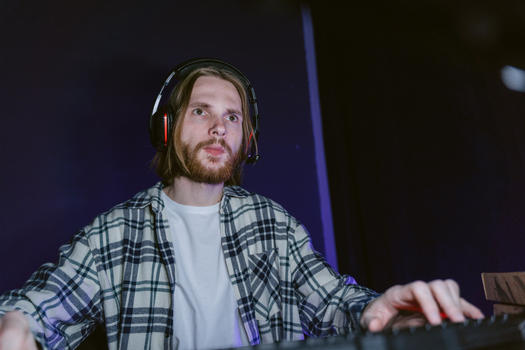Ever notice how gaming can be a very good escape from reality? You create your own little world and escape even if just for a little while.
For a large part of my life, I didn’t want to look at my emotions, I wanted to escape them. Most of the time I didn’t really know exactly how I felt, and I didn’t want to know. I couldn’t risk thinking about it and getting pulled deeper, it felt too uncontrollable to even dip my toe in. Instead, I settled for distracting myself.
“It can’t hurt me if I don’t think about it,” I thought.
Letting my mind get swept away to another planet, I could convince myself that I felt fine. It was like being sucked into an emotional wormhole where I could linger forever in limbo. However, it was always a temporary fix. As soon as I snapped back to reality, things often felt even worse.
Of course, distraction can be a reasonable coping technique when we feel completely overwhelmed and aren’t in a safe space to let it all out. If I’m feeling sad while at work, it’s better to distract myself to avoid bursting into tears at my desk and waiting until I’m in a safe space at home!
However, I continued to ignoring how I was feeling for years without ever stopping to process the feelings. This created a toxic cycle where the more I pushed the scary feelings away, the bigger and more unmanageable they became. Eventually it got to the point where any tiny let down felt like the end of the universe. The pressure built so high that I felt I might physically burst, but I had no idea how to let off the steam.
In the end, it became impossible to distract myself enough. The pain I felt was too strong, and it was impossible to maintain a state of distraction 24 hours a day. Luckily, a couple of people in my life finally noticed that something was off, and gently suggested I seek some help.
Years later, I still have some escapist habits. I get way too involved in playing silly phone games to pass the time, or waste hours going down a YouTube wormhole when I should be asleep in bed. What has changed is my ability to balance these natural human tendencies with some intentional, emotionally focused self-care. When I feel myself getting so frustrated that I can’t think straight, I go for a run. When I’m sad about something I can’t change, I write my thoughts into a notebook until I run out of words. When I’m so anxious it’s making me sick, I ask to vent with a supportive friend.
At the end of the day a little escapism is normal. However, when it starts to mean ignoring the deeper feelings and missing out on other aspects of life, perhaps it’s time to put the distractions down and focus on real connections – whether it’s with ourselves or others.
This piece was written by one of the ICLA eFriend Peer Support Workers. eFriend is an online platform where you can connect with a trained peer support worker whom has their own lived experience of feeling lonely, isolated, stressed or worried. You can speak to your eFriend Peer via video or phone call. Your eFriend Peer will listen, validate and provide hope. If you like, they can also assist you to identify any other services you may like to try or help you create plans to improve your personal well-being. Or they can simply listen.
To book your first call visit: https://my.efriend.org.au/preregistration/


